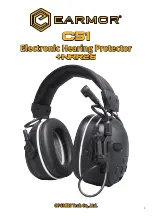
CONSUMER INFORMATION SHEET FOR PLAYGROUND SURFACING MATERIALS
the u.s. consumer Product safety commission (cPsc) estimates that about 100,000 playground equipment related
injuries resulting from falls to the ground surface are treated annually in U.S. hospital emergency rooms.
Injuries involving this hazard pattern tend to be among the most serious of all playground injuries, and have the
potential to be fatal, particularly when the injury is to the head. The surface under and around playground equipment
can be a major factor in determining the injury-causing potential of a fall. it is self-evident that a fall onto a shock-
absorbing surface is less likely to cause a serious injury than a fall onto a hard surface. However, it should be
recognized that some injuries from falls will occur no matter what playground surfacing material is used.
Playground equipment should never be placed on hard surfaces such as concrete or asphalt. Grass may appear to be
acceptable, but can turn to hard packed earth in areas of high traffic. shredded bark mulch, wood chips, or fine gravel
are considered to be acceptable shock absorbing surfaces when installed and maintained at a sufficient depth under and
around play equipment.
tABLe 1 -criticAL HeigHts (in feet) of testeD mAteriAL
MATERIAL
UNCOMPRESSED DEPTH
COMPRESSED DEPTH
6 Inch 9 Inch 12 Inch
9 inch
Wood Chips
7 10
11
10
Double Shredded Bark Mulch
6 10
11
7
Engineered Wood Fibers
6 7
>12
6
fine sand
5 5
9
5
coarse sand
5 5
6
4
Fine Gravel
6 7
10
6
medium gravel
5 5
6
5
shredded tires**
10-12 n/A
n/A
n/A
** This is data from tests conducted by independent testing laboratories on a 6 inch depth of uncompressed shredded
tire samples produced by four manufacturers. The test reported critical heights, which varied from 10 feet to greater
than 12 feet. It is recommended that persons seeking to install shredded tires as a protective surface request test data
from the supplier showing the critical height of the material when it was tested in accordance with ASTM F1292.
Table 1 should be read as follows: If, for example, uncompressed wood chips are used at a minimum of 6 inches, the
Critical Height is 7 feet. If 9 inches of uncompressed wood chips are used, the Critical Height is 10 feet. It should
be noted that, for some materials, the Critical Height decreases when the material is compressed. It is recommended
that a shock absorbing material should extend a minimum of 6 feet in all directions from the perimeter of stationary
equipment such as climbers and slides. However, because children may deliberately jump from a moving swing, the
shock absorbing material should extend in the front and rear of a swing a minimum distance of 2 times the height of the
pivot point measured from a point directly beneath the pivot on the supporting structure.
this information is intended to assist in comparing the relative shock-absorbing properties of various materials. no
particular material is recommended over another. However, each material is only effective when properly maintained.
Materials should be checked periodically and replenished to maintain correct depth as determined necessary for your
equipment. The choice of a material depends on the type and height of the playground equipment, the availability in
your area, and its cost.
this information has been extracted from the cPsc publications “Playground surfacing-technical information guide”
and “Handbook for Public Playground Safety.” Copies of these reports can be obtained by sending a postcard to:
office of Public Affairs
U.S. Consumer Product Safety Commission
Washington, D.C. 20207
toll-free Hotline: 1-800-638-2772 or at http://www.cpsc.gov






































